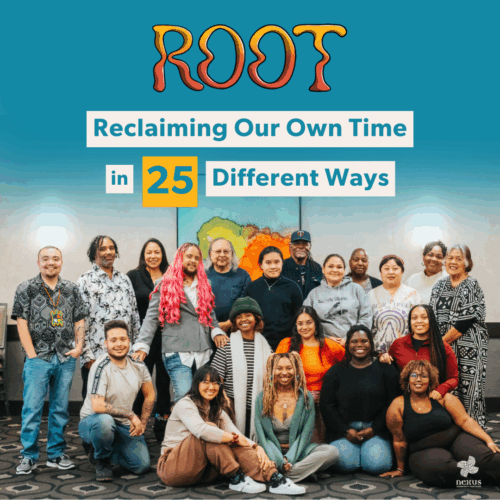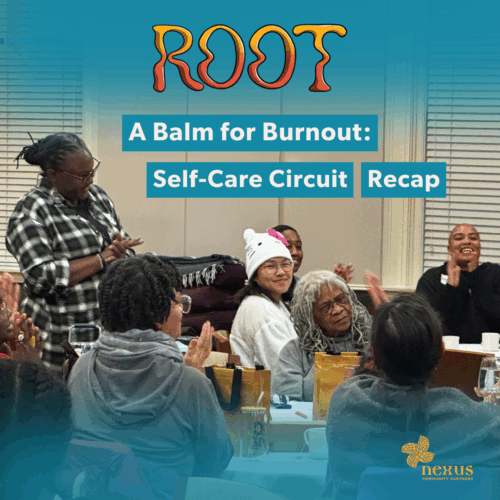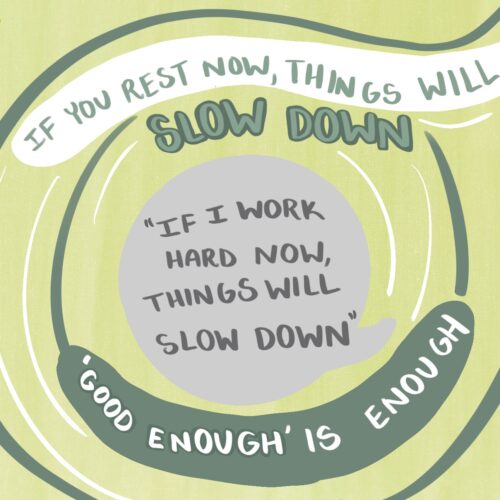Rhythmic Sabbatical FAQ
All people deserve joyful and abundant lives filled with the rest that our bodies, minds, and spirits need. ROOT (Reclaiming Our Own Time) recognizes the need for deep rest to take care and reclaim our lives from the demands of the world. This is an investment in the individual and collective well-being of our movement leaders.
Our vision for the sabbatical fellowship is to create different deep-rest opportunities for BIPOC leaders in Minnesota who create and nurture community change. The Rhythmic Sabbatical Fellowship offers monthly sabbatical-like experiences designed for fellows who cannot take a continuous stretch of time off but would still like to cultivate their own rest practices.
We heard from community members that typical sabbatical programs, where someone takes a few months off, are not feasible for them due to many obligations in life. The Rhythmic Sabbatical Fellowship is our innovative option to address that.
If you have been doing community change work for a significant part of your life and desire an opportunity to rest deeply, but cannot take a continuous stretch of time off, this program is for you.
Community change work can take place in many areas of a person’s life, such as at someone’s workplace, neighborhood, school, or faith community. The work can have hyperlocal impacts (i.e., within your own neighborhood or specific community) or impacts on a larger area or system (i.e., health care, democracy).
Existing sabbatical opportunities tend to be for people in formal leadership positions. ROOT’s sabbatical fellowship is designed to address this limited perception of “leadership.” We very intentionally and explicitly invite experienced BIPOC nonprofit leaders, as well as those who may identify more readily as movement builders, movement leaders, or activists. Community change work helps us break past the typical confines that limit access to sabbaticals.
If you have spent years of your life dedicated to making the world better for our communities of color, and you identify as Black, Indigenous and/or a Person of Color, this sabbatical is for you.
Examples of individuals who might be a good fit for this fellowship:
- A community elder who has held space in their dining room for important dialogues for decades
- A young queer activist who works tirelessly for gender-neutral bathrooms in their college dorms
- An auntie who consistently cooks delicious meals and fresh produce for her unhoused neighbors
- A mid-career social worker who shows up for unscheduled conversations much needed by the students in his school
- A concerned professional who establishes an employee resource group for women of color at their workplace
- A young leader at a place of worship who plants a communal medicine garden with their elders
- A local councilperson who advocates for state funding for ethnic studies
- A nonprofit founder who creates a program serving families in his native language
- An artist who curates a series of art workshops for the trans community
And many, many other people creating and nurturing change in many other ways!
We recognize that doing community change work requires us to be nourished for the long run. We need deep rest to connect with ourselves, our purpose, and our vision. This sabbatical program carves out pockets of time to help cultivate that deep rest.
Sometimes it is easier for a group of individuals who are connected by their work, their passion, and/or their relationships to build and cultivate deep rest together. This allows for a deeper, reciprocal accountability to rest, too.
For the 2025 Rhythmic Sabbatical Fellowship, one group will be randomly selected to be in the fellowship of fifteen individuals. We define a group to consist of up to five (5) individuals.
We define these as groups who are working together or are in a communal relationship together, and it is important for you all to pursue rest together. Some examples to illustrate:
- Three co-directors of a community-led theater company producing queer stories by playwrights of color
- A group of four consisting of a mother and three daughters, who cook and transport members of the nearby unhoused community to their appointments, work, and classes
- A chosen family of three trans Black elders who want to spend time writing the story of their lives and what it means to be Black elders in Minnesota
- A pair of auntie and youth who grow an Indigenous medicine garden for their community members to use for healing purposes
- A group of five Hmong women of different ages who worked on issues of gender justice in their clans
- A group of intergenerational, intercultural women activists from central Minnesota who have been mentors to each other for a decade
- Three Latine councilpersons who have served several legislative sessions
- And more!
As you can tell, by resting together, these groups can benefit from supporting each other’s commitment to reclaiming their own time, and to help each other be accountable.
You can send in separate applications as an individual applicant AND be part of a group application! You will not be disqualified.
Note: You can only have one individual application, and you can only be part of one group application.
However, during the randomization process, you will only be selected once (i.e., if you’re selected as part of a group, you will not be selected as an individual applicant).
Application Period Timeline for 2025 ROOT Rhythmic Sabbatical Fellowship:
- Application: Opens Monday, March 3, 2025 and closes Monday, March 24, 2025 by 11:59 pm Central Time
- Review of eligibility and random selection: By mid-April 2025
- Fellows will be notified by mid-April. Chosen fellows will be expected to provide their reference checks for us to complete, in addition to the documents required. Don’t forget: You need to make sure that you can make the sabbatical fellowship dates in full attendance.
The fellowship dates:
- Orientation: Thursday, April 24, from 12 – 1 pm (virtual)
- Session 1: Tuesday, May 13 to Thursday, May 22 (New Orleans)
- Session 2: Friday, July 11 to Sunday, July 13 (Twin Cities)
- Session 3: Friday, August 15 to Sunday, August 17 (Greater Minnesota)
- Session 4: Friday, September 19 to Tuesday, September 23 (Greater Minnesota)
- Session 5: Friday, October 17 to Sunday, October 19 (Twin Cities)
- Session 6: Friday, November 14 to Saturday, November 15 (Twin Cities)
We recognize that deep rest is needed in our communities. We too recognize that application processes can pit community members against each other, reinforcing who is seen as worthy and deserving. We discussed this at length with the guidance of our Sabbatical Design Committee. The committee’s input has led to a simple, reflection-focused application with fewer questions to invite applicants from all walks of life.
Fifteen (15) rhythmic sabbatical fellows will be chosen at random from the pool of eligible applicants. This includes a group application (of up to 5 individuals, which will make up part of the 15). We will review all applications for eligibility, completeness, and alignment with our funding criteria. All eligible, complete, and aligned applicants will be included in the pool for random selection. In cases where selected applicants withdraw, do not advance, or otherwise drop out of the process, we will randomly select another applicant from the eligible applicant pool.
While we do not use application answers to judge or select fellows, your willingness to reflect deeply in the essay portion of the application shows serious commitment to this sabbatical.
Resting deeply looks different for everyone, and learning what rest looks like for us requires sustained reflection. We want you to use this application to consider your commitment to this sabbatical experience. Are you ready for this opportunity? If it feels like a big “yes!”, we look forward to your application!
The term BIPOC stands for Black, Indigenous, and People of Color. It is a broad person-first acronym used to describe people who are not white, while noting that Black and Indigenous people face disproportionate discrimination and prejudice in places like Minnesota. Learn more about BIPOC here.
We can understand that this terminology does not fully resonate with everyone. Sometimes, terms like the Global Majority, Black and Brown communities, among others, have been used. For now, we are gently using this imperfect term BIPOC, and will continue monitoring for better terms over time.
This sabbatical fund is for BIPOC community members because these opportunities are often not accessible or available for BIPOC folks. BIPOC communities and other historically oppressed and ignored communities have suffered under racist and patriarchal systems of oppression since the founding of our country. And, they have been fighting against these systems for just as long.
This fight against and within a racist society is taking a toll on our community leaders. Chronic stress and generational trauma are harming our physical and mental health and our ability to show up every day, as fully human. Burnout and fatigue, and subsequently its health and life impact, are disproportionately experienced by those who identify as BIPOC.
Our funders have committed to addressing some of the racial inequities in accessing rest, thus the focus of our work. The ROOT Rhythmic Sabbatical Fellowship is an investment in the individual and collective well-being of our movement leaders and is fundamental to sustaining current leaders and developing future leaders.
Black, Indigenous, and People of Color communities have faced land theft, wage theft, and many other kinds of violence that have made it difficult to build generational wealth in the US.
As with our inaugural Continuous Sabbatical Cohort, we have considered implementing an income or wealth cap, but decided not to—people know their own financial situations best. We encourage our community members to consider their own individual resources, networks, and material wealth when determining whether to apply.
We encourage you to apply for the Sabbatical Fellowship if you have not been granted similar opportunities, and if you cannot access other opportunities to take extended time off through your workplace or through personal or familial wealth.
For this cohort, we can only financially support fifteen fellows. We would like to expand and support larger cohorts in the future. Please reach out to us if you are interested in funding this crucial work!
No. We recognize that activism and systems change work can begin at any age, and many movements have been fueled by the passion and labor of youth. To disperse the funds directly to the fellows, however, they legally must be over the age of 18.
In group applications, this applies to everyone listed on the application.
Applicants must be able to prove that they have lived in Minnesota continuously for at least 3 months prior to their application submission date.
In group applications, this applies to everyone listed on the application.
You will need to cash a check in your name at a financial institution in order to receive the stipend. The tax implication of this fellowship is up to the advisement of your financial professional.
The application includes a mix of demographic questions and narrative responses. Access it here.
Our reflection questions are our invitation for you to slow down and consider what this sabbatical opportunity will do for your rest practice. Because your answers will not determine if you are selected, we hope you will use them as an opportunity to seriously reflect on your hopes and dreams around rest.
We do read these responses. Please do not leave them blank, or respond with “test test test” or merely repost the question itself. That is not the spirit in which we ask these questions.
These are some prompts you can consider for your answers:
Question 1: What has your experience with rest been? (up to 300 words)
- Tell us a story of a time when you felt restful.
- Tell us one joyful and one challenging experience you’ve faced in resting.
- Describe your relationship with rest throughout the years.
- Describe some practices you hold dear that allow you to feel restful.
Question 2: We define rest as activities, physical movements, or experiences that bring you deep joy, peace, and make you feel restored. How would you like your rest practice to be? (up to 300 words)
- Consider ways you can be more dreamful and playful.
- What are some emotions or values tied to rest that you would like to experience more often?
- What are some ways of resting that you would like to try in this stage of your life?
Question 3: How do you envision the sabbatical resources (stipend, workshops, fellowship) supporting your vision for rest? (up to 300 words)
- Consider the power of being in a cohort who aspires to build a sustainable way to rest. What might come out of these relationships?
- Consider what it means to connect to cultural healers, coaches, and workshops to explore rest practices.
- Consider how having the financial resources will enable you to try something new and restful.
Question 4: Tell us an example of a community change work you’ve done or led that you are most proud of. (300 words)
- Consider the reason why a sabbatical will help you stay committed to your calling.
- Consider the impact you have had on a specific group within the BIPOC (Black, Indigenous, People of Color) community.
We want you to use this section to truly reflect on the choice and joy of applying to this sabbatical program as a group!
Question 1: Please tell us how the group will cultivate and help each other uphold rest on this sabbatical journey? (up to 300 words)
- Think of what it means to help each other be accountable in a way that nourishes your relationship together.
- Rest can be hard when your context is shared. How can you help each other honor this need for rest?
Question 2: Please tell us how this experience will transform your group. (up to 300 words)
- Consider why you all choose to do this as a group, when you could have applied as individuals? What is the benefit of doing this together?
- What is the best outcome of experiencing rest together?
For the 2025 Rhythmic Sabbatical Fellowship, we do not have the capacity to accept applications in languages other than English.
We are committed to sharing key insights about the applicant pool’s collective rest dreams and practices with our community. We plan to share a report on applicant and fellow demographics, as well as lessons learned from the sabbatical experience. Along the way, we may have additional stories, insights, and resources we share publicly through our website, social media, and Care Package newsletters.
If selected, we will ask for your:
- Bank account information, including your routing and account numbers
- W-9 (requires an SSN or TIN)
- Proof of identification and proof of residency
- Types of identification we accept include state-issued IDs or driver’s licenses, school IDs, tribal IDs, U.S. Permanent Resident Cards, and more. See the full list of documents we accept.
- Proof of travel document that is compliant with the REAL ID laws. We are traveling out of state for our first stop, and with the new laws coming in place by May 7, we will need to make sure you are REAL ID compliant. To read more: https://www.dhs.gov/real-id
- A reference from a community member (or a group) who also identifies as BIPOC (Black, Indigenous, Persons of Color) to attest to your community impact.
Nexus Community Partners is a non-profit, 501(c)(3) organization. We are legally obligated by the Internal Revenue Service (IRS) to issue 1099s to individuals to whom we have given more than $600. We need a W-9 in order to do so. Unfortunately, there is very little we can do to overcome these legal barriers.
We believe that rest is truly our birthright; we encourage you to keep resting. We often share upcoming rest opportunities through our Care Package email newsletter.
Some other sabbatical funding opportunities available in Minnesota include:
- Black Legacy Fellowship
- McKnight Cultural Bearers Fellowship – not a sabbatical, but another cool opportunity
- Open Road Fund – applications reopen Summer 2025


